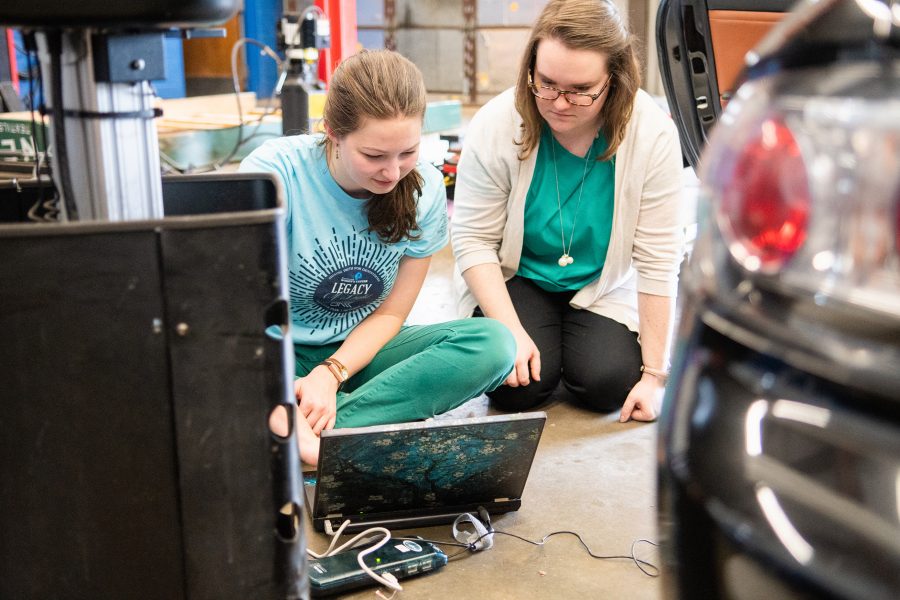A recent government grant will enable BJU engineering students to explore the field of autonomous vehicles. The University’s engineering department will be involved in the Intelligent Ground Vehicle Competition (IGVC) held this summer in Michigan.
The competition tests students from around the country in their ability to create an autonomous vehicle that can drive itself through a maze. BJU has been involved in the IGVC for over 10 years, and it frequently places in the top five or top 10.
In the earlier years of the competition, the University entered wheelchair-sized robots in the competition.
Three years ago, BJU became one of only a few schools that entered a newly-created higher level of competition. This competition involved the assembling of golf cart-sized vehicles.
Dr. Bill Lovegrove, head of the engineering department at BJU, said that competitions like this serve an important purpose for the engineering department. “We like to be involved in engineering competitions because it lets us compare ourselves against other schools” he said. “It’s a way to measure how good our engineering program is.”
Golf cart robots can be difficult to test because of the many regulations placed on where and under what circumstances golf carts are street legal. However, the competition is also open to another category of a similarly-sized vehicle called Low-Speed Electric Vehicles (LSEV).
LSEVs are roughly the size of a golf cart, are entirely battery powered and still have a maximum speed of about 25 mph. A critical distinction between the two types of vehicles—golf carts and LSEVs—is that LSEVs possess all of the standard safety features of a typical car such as headlights, windshield wipers and seatbelts.
Because of this, LSEVs are street legal on any road with a speed limit under 35 mph at any time of day.
This year the Intelligent Ground Vehicle Competition now requires all entries to be LSEVs. Because of the cost of buying a new vehicle, BJU may not have been able to enter the competition this year, but the University has received a research grant.
The IGVC received a government grant for research of autonomous vehicles and chose BJU as one of five colleges to receive funds to develop their entries. The five colleges working on the project are using government robotics software to develop the self-driving vehicle and will be reporting their results back to the government.
University students in a senior engineering class called mechatronics, the study of computer-controlled machines, will modify the vehicle to drive autonomously. This project will serve as their semester project for the class.
William Woodham, the faculty member who teaches the mechatronics class, said the project employs several different facets and skills of engineering. “This type of project requires a multidisciplinary team of engineers,” he said. “We need engineers with knowledge and experience with mechanical systems, electrical systems and computer systems.”
Woodham said the project provides a valuable practical learning experience for students. “It’s going to give students the opportunity to work on a multidisciplinary team of engineers and to work in a team environment to solve a really big problem,” he said.
Woodham said that this project gives students hands-on experience that will help prepare them for challenges they may face after graduation. “Students are going to have a very valuable experience doing that, and that’s going to help them a lot in the industry and whatever job they’re going to be in,” Woodham said.
Kyle Weberg, a student working on the project, appreciates the opportunity to work on the vehicle.He said hands-on work reveals challenges that are not necessarily obvious in the mathematical and theoretical parts of engineering.
“You can have a lot of theory, but it doesn’t tend to stick as well until it comes into the real world,” he said. “There’s a lot more details than theory.”
Woodham explained how this project presents another unique type of challenge. “There is a big push right now around the world to make cars self-driving,” he said.
“It’s a really hard problem to solve because it’s really hard to replace human judgement, and ultimately, you can’t replace it completely. In order to make a system autonomous, you have to think about all the possible scenarios [and] what could go wrong.”
Formerly, the University’s extracurricular robotics team developed the IGVC entry. But this year they will be building a tabletop-sized robot for a separate competition since the senior engineering class will be developing the IGVC entry.























































